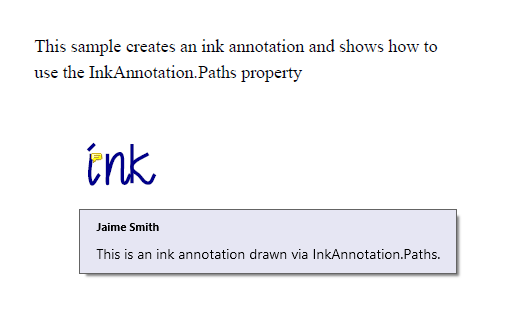- Document Solutions for PDF Overview
- Key Features
- Getting Started
- Product Architecture
-
Features
- Attachment
-
Annotations
- Text Annotation
- Free Text Annotation
- Line Annotation
- Polyline Annotation
- Square Annotation
- Circle Annotation
- Polygon Annotation
- Stamp Annotation
- Ink Annotation
- File Attachment Annotation
- RichMedia Annotation
- Sound Annotation
- Widget Annotation
- Watermark Annotation
- Redact Annotation
- Text Markup Annotation
- Caret Annotation
- Appearance Streams
- Document
- Document Optimization
- Font
- Forms
- Form XObjects
- Graphics
- Output Intents
- Images
- Incremental Update
- Linearization
- Links
- Outline
- Pages
- Layouts
- Complex Graphic Layouts
- Tables
- Security
- Digital Signature
- Soft Mask
- Stamps
- Tagged PDF
- Parse PDF Documents
- Layers
- Text
- Text Search, Replace and Delete
- Watermark
- Sound Actions
- Access Primitive and High-Level PDF Objects
- Render HTML to PDF
- Save PDF as Image
- Barcodes in PDF
- Best Practices
- Document Solutions PDF Viewer Overview
- Samples
- Walkthrough
- API Reference
- Release Notes
Ink Annotation
An ink annotation represents a freehand scribble composed of one or more disjoint paths. When an ink annotation is opened, it displays a pop-up window containing the text of the related note. DsPdf provides InkAnnotation class to enable users to apply ink annotations to the PDF file.

InkAnnotation class provides the following properties to set various options for the ink annotation:
Property | Description |
|---|---|
UserName | Adds the user name to the text label in the title bar of the annotation’s pop-up window when the annotation is open and active. |
Subject | Adds the text representing the subject of the annotation. |
Contents | Adds the text to the annotation for display. |
RichText | Adds the text to the annotation for display in the pop-up window when opened. You can format this text using HTML tags. |
Opacity | Sets the opacity of the annotation. |
LineWidth | Sets the line width in points. |
LineDashPattern | Sets the line dash pattern. Null means a solid line. |
Color | Sets the annotation color, popup window color, line color, etc. |
PdfRect | Sets the rectangle that defines the location and size of the annotation on a page in PDF user space coordinates. The positive X axis extends horizontally to the right, and the positive Y axis extends vertically upward, with the origin usually in the lower left corner of the page. |
Paths | Sets the list of lists of points, in which each list of points represents a stroked path. The coordinates of points are relative to the upper left corner of the page's media box, with the Y (vertical) coordinates increasing from top to bottom. |
Refer to the following example code to add an ink annotation to a PDF document:
public void CreateInkAnnotation()
{
var doc = new GcPdfDocument();
var page = doc.NewPage();
RectangleF rc = new RectangleF(50, 50, 250, 50);
page.Graphics.DrawString("This sample creates an ink annotation and shows how to use the " +
"InkAnnotation.Paths property",
new TextFormat() { Font = StandardFonts.Times, FontSize = 11 }, rc);
//Create an instance of InkAnnotation class and set its relevant properties
var inkAnnot = new InkAnnotation()
{
UserName = "Jaime Smith",
PdfRect = new RectangleF(rc.Left, rc.Bottom + 20, 72 * 5, 72 * 2),
LineWidth = 2,
Color = Color.DarkBlue,
Contents = "This is an ink annotation drawn via InkAnnotation.Paths."
};
float x = 80, y = rc.Bottom + 24, h = 18, dx = 2, dy = 4, dx2 = 4, w = 10, xoff = 15;
// Scribble 'ink annotation' text:
// i
List<PointF[]> paths = new List<PointF[]>();
paths.Add(new[] { new PointF(x + w / 2, y), new PointF(x + w / 2, y + h),
new PointF(x + w, y + h * .7f) });
paths.Add(new[] { new PointF(x + w / 2, y), new PointF(x + w / 2, y + h),
new PointF(x + w, y + h * .7f) });
paths.Add(new[] { new PointF(x + w / 2 - dx, y - h / 3 + dy),
new PointF(x + w / 2 + dx, y - h / 3) });
// n
x += xoff;
paths.Add(new[] { new PointF(x, y), new PointF(x, y + h), new PointF(x, y + h - dy),
new PointF(x + w*0.7f, y),
new PointF(x + w - dx/2, y + h*.6f), new PointF(x + w, y + h), new PointF(x + w + dx2, y + h*.7f) });
// k
x += xoff;
paths.Add(new[] { new PointF(x, y - h / 3), new PointF(x, y + h) });
paths.Add(new[] { new PointF(x + w, y), new PointF(x + dx, y + h/2 - dy), new PointF(x, y + h/2),
new PointF(x + dx2, y + h/2 + dy), new PointF(x + w, y + h), new PointF(x + w + dx2, y + h*.7f) });
inkAnnot.Paths = paths;
page.Annotations.Add(inkAnnot);
doc.Save("InkAnnotation.pdf");
}

